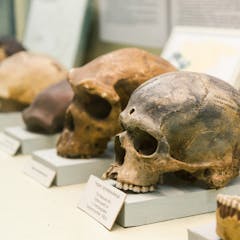
Articles on Human evolution
Displaying 1 - 20 of 195 articles

A mysterious century-old law of genetics may explain the puzzling genetic legacy of our extinct Neanderthal cousins.

The two human species had many similarities but their communication would have been different.

Some anthropologists question how much rare activities like big-game hunting could have affected how our species evolved. Instead they’re looking at daily activities like carrying water or firewood.

The story of human evolution is inextricable from the story of gynaecology.

A new discovery is shedding more light on the overlap between the two species of human, despite the challenges of exploring this distant time

New fossil studies tell us our ancient ancestors enjoyed a diet of soft, sweet fruits. This would have influenced where they lived and spread to – and even the evolution of colour vision.

Two dental experts explain that these furthest-back molars may be a not-so-necessary leftover from early human evolution.

How, when and where did modern humans evolve? Nobody has all the answers, but studying rock and dirt can put the debate on firmer footing.

Female bodies have an advantage in endurance ability that means Paleolithic women likely hunted game, not just gathered plants. The story is written in living and ancient human bodies.

The exhibit offers a close look at the problematic history of palaeoanthropology.

Experts speculated that very early humans worked wood, but previously didn’t have the evidence.

The findings reveal a close association between climatic conditions and early human migrations out of Africa.

Experts insist there is no scientific reason for allowing these fossils to travel to space.

Ancient humans chose to sleep less, which had evolutionary benefits. For modern humans, sleeping less is futile and detrimental, but fitness may be a powerful ally in today’s epidemic of sleep loss.

There are areas of biology that may be considered optional at younger year levels, such as botany, entomology and marine ecosystems. Evolution is not one of these.

Homo naledi had a brain less than half the size of our own. Yet the new research claims it had cognitive abilities far beyond what we might expect.

Genetic evidence reveals a long, previously unknown period of adaptation to cold climates in the history of ancient human migrations across the globe.

Signs of controlled fire use from Spain are at least 50,000 years older than previous evidence.

When you stop treating AI as another human, you’ll get on with it better.

The analysis could help us understand behavioural differences between the two groups of humans.
